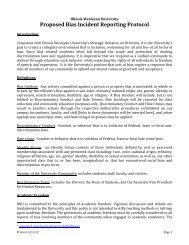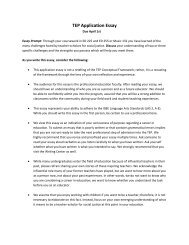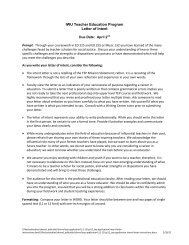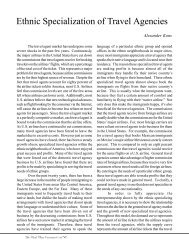You also want an ePaper? Increase the reach of your titles
YUMPU automatically turns print PDFs into web optimized ePapers that Google loves.
<strong>Sigmund</strong> <strong>Freud</strong> - Wikipedia, the free encyclopedia<br />
patterns of repression among his patients in order to derive a general model of the mind, he also observed that<br />
individual patients repress different things. Moreover, <strong>Freud</strong> observed that the process of repression is itself a<br />
non-conscious act (in other words, it did not occur through people willing away certain thoughts or feelings).<br />
<strong>Freud</strong> supposed that what people repressed was in part determined by their unconscious. In other words, the<br />
unconscious was for <strong>Freud</strong> both a cause and effect of repression.<br />
Psychosexual development<br />
Main article: Psychosexual development<br />
<strong>Freud</strong> also believed that the libido developed in individuals by changing<br />
its object. He argued that humans are born "polymorphously perverse,"<br />
meaning that any number of objects could be a source of pleasure. He<br />
further argued that, as humans developed, they fixated on different and<br />
specific objects through their stages of development—first in the oral<br />
stage (exemplified by an infant's pleasure in nursing), then in the anal<br />
stage (exemplified by a toddler's pleasure in controlling his or her<br />
bowels), then in the phallic stage. <strong>Freud</strong> argued that children then passed<br />
through a stage where they fixated on the parent of the opposite sex and<br />
thought the same-sexed parent a rival. <strong>Freud</strong> named his new theory the<br />
Oedipus Complex after the famous Greek tragedy by Sophocles.“I found<br />
in myself a constant love for my mother, and jealousy of my father. I now<br />
consider this to be a universal event in childhood” <strong>Freud</strong> said. <strong>Freud</strong><br />
sought to anchor this pattern of development in the dynamics of the mind.<br />
Each stage is a progression into adult sexual maturity, characterized by a<br />
strong ego and the ability to delay gratification. (see Three Essays on the<br />
Theory of Sexuality.) It also seems that <strong>Freud</strong> believed that the<br />
manipulation of the genitals and the sexual desires are something that<br />
undermines the human as oneself. Surrendering to his sexual desires<br />
would mean the unconscious as the triumphant mind.<br />
<strong>Freud</strong> hoped to prove that his model was universally valid. He thus turned to ancient mythology and<br />
contemporary ethnography for comparative material. <strong>Freud</strong> used the Greek tragedy by Sophocles Oedipus Rex to<br />
point out how much he believed that people (young boys in particular) desire incest, and must repress that desire.<br />
The Oedipus conflict was described as a state of psychosexual development and awareness. He also turned to<br />
anthropological studies of totemism and argued that totemism reflected a ritualized enactment of a tribal Oedipal<br />
conflict.<br />
No discussion of <strong>Sigmund</strong> <strong>Freud</strong> is complete without some mention of his highly influential views on the role and<br />
psychology of women; views which set the progress of women in Western culture back decades. Believing as he<br />
did that women were a kind of mutilated male, who must learn to accept her deformity (the lack of a penis) and<br />
submit to some imagined biological imperative, he contributed a great deal to the vocabulary of mysogyny - terms<br />
such as penis envy, and castrating (both used to describe women who attempted to excel in any field outside the<br />
home) were used to discourage women from obtaining education or entering any field dominated by men, until<br />
the 1970s. It is also rumored that he developed some of his theories about the sexual fantasies of children toward<br />
their parents to cover up at least one case misconduct by an adult colleague of his toward one of his patients<br />
(Dora). <strong>Freud</strong>'s views on women's equality still have an unfortunate effect on the status of women in the<br />
professions.<br />
The id, ego and superego<br />
http://en.wikipedia.org/w/index.php?title=<strong>Sigmund</strong>_<strong>Freud</strong>&printable=yes<br />
Page 4 of 10<br />
What's on a man's mind – <strong>Sigmund</strong><br />
<strong>Freud</strong><br />
7/13/2005

















